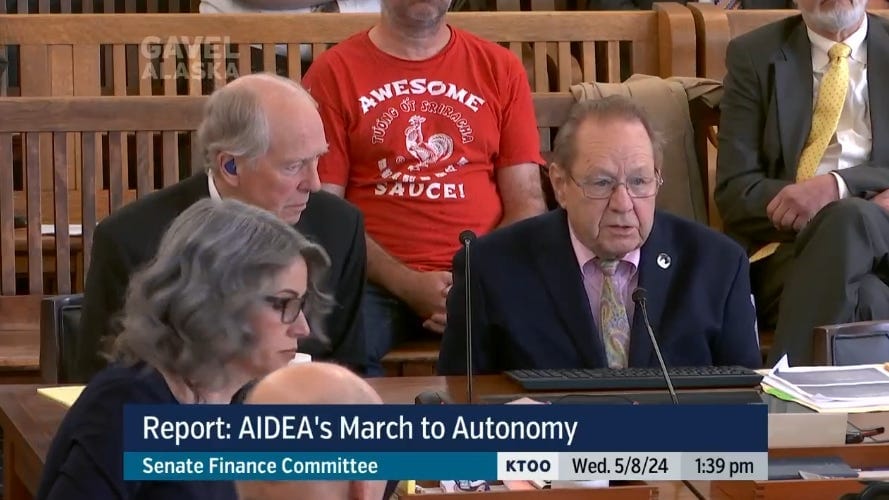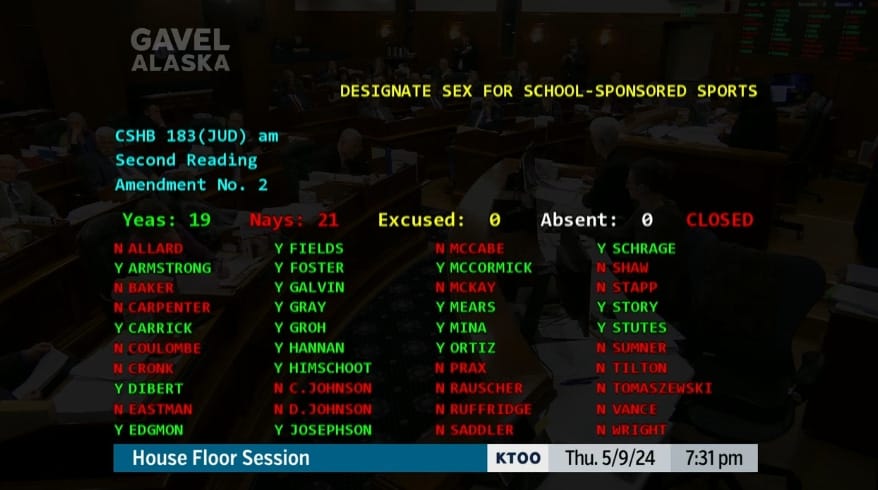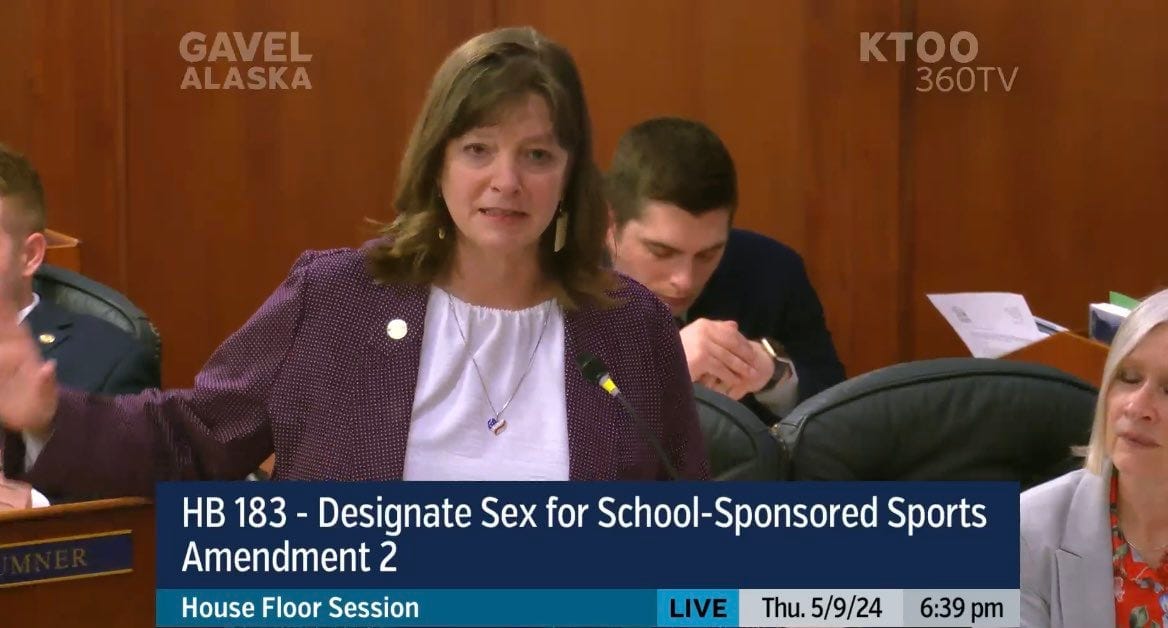AKLEG Day 116: 'A major waste'
The final countdown.

Happy Friday, Alaska!
In this edition: The final days of the legislative session are upon us, putting a premium on the remaining days and hours to get critical legislation around energy, education and the budgets across the finish line. So, it says a lot about where the House Republicans’ efforts are when they’re running headlong into a multi-day fight over their trans sports ban bill, which has zero chance of passing through the Senate. But before that, let’s break down a pretty head-turning hearing about the questionable job claims of the Alaska Industrial Development and Export Authority. Also, a rundown of this week’s threads, the reading list and weekend watching.
Current mood: 😤
‘A major waste’

Self-described “geriatric economists” Gregg Erickson and Milt Barker were in front of the Senate Finance Committee this week to give an overview of their reports casting serious doubts on the job claims of the Alaska Industrial Development and Export Authority. Both long-time fixtures of Alaska, neither man had a particularly optimistic view of the state economic development agency, noting that the state would be $10 billion richer by their estimate had the state just put the money it gave to AIDEA into the Alaska Permanent Fund. They also cast significant doubt on the agency’s claims that it has fueled significant economic growth in Alaska, pointing to a report that showed their crown jewel project—the Red Dog Mine—was profitable without the state subsidy.
“A major waste,” Erickson said of the agency’s limited partnership loan program. “It really doesn’t produce what AIDEA says it produces. It doesn’t produce anywhere near the jobs they claim. It’s basically a subsidy for commercial property developers that they don’t need.”

The two produced a series of reports examining AIDEA for SalmonState, which Erickson said has paid them about $55,000. They were deeply critical of AIDEA’s performance—essentially accusing them of subsidizing projects that were already going to be successful while making a bunch of bad bets. They also cast doubt on the job numbers, noting that the agency has never done a rigorous study and has relied on self-reported numbers from its loan partners. Because of the Red Dog Mine’s underlying profitability, they also discounted its job numbers from their report.
These were all points that AIDEA Executive Director Randy Ruaro, a former chief of staff to Gov. Mike Dunleavy, bitterly contested. He argued that the agency should get credit for Red Dog Mine, pointing to legislative approval for the project as proof that it was needed, and the whole analysis would change if those numbers were included.
However, Ruaro seemed to take a particularly bizarre approach to justifying the agency’s continued work. He argued that one of the biggest benefits of state-subsidized development in rural Alaska is jobs, which he claimed will help lower high suicide rates. That, he said, is something they’re looking at studying.
“I would guess that the suicide rates among people employed at Red Dog are probably much lower than people who are unemployed,” he said.
Ruaro also had a tense exchange over the fate of the Ambler Mine, a project that the agency has spearheaded over the objections of several Alaska Native groups and villages that see the 200-mile road as a threat to subsistence lifestyles. The project was dealt yet another setback this week when NANA Corp. announced that it was pulling its land use permits. Asked about it by Sens. Lyman Hoffman and Donny Olson, Ruaro said that it wasn’t changing the course of the project and that he planned to continue to work to educate the groups on the benefits of the mine project.
The NANA Corp. statement notes that its main reason for withdrawing is the state’s failure to properly consult with local communities along the route, noting: “This decision reflects unmet criteria, insufficient consultation, and a lack of confidence in the project’s alignment with our values and community interests.”
But perhaps one of the more head-turning exchanges came when Ruaro attacked SalmonState as an agent of liberal elites. Sen. Jesse Kiehl noted that one of the articles he linked to included an anti-semitic dog whistle in referencing “(George) Soros and other elites.”
“What in the name of heaven is that doing in your materials?”
Ruaro brushed off his concerns, saying it wasn’t meant to be anti-semitic but simply an effort to illustrate how wealthy elites secretively influence the process (a common anti-semitic trope). Here’s that exchange:
As far as what’s next, the Senate Finance Committee isn’t planning on advancing any sweeping overhauls in the remaining days of the session, but Sen. Bert Stedman also made clear that they weren’t going to be giving the agency any more leash, either. He noted that their open-ended request for $300 million in borrowing authority for some yet-to-be-determined mine project was dead on arrival in the Senate.
“The Senate Finance Committee is not interested at all,” he said.
The Alaska Memo by Matt Buxton is a reader-supported publication. To receive new posts and support my work, consider becoming a free or paid subscriber.
‘Harm’

The Alaska Legislature is fast approaching its constitutional 121-day limit, putting a premium on the remaining days and hours of the session to get critical issues such as energy, education and the budget across the finish line. It’s when all the hopes and possibilities of the session’s early days collapse into the reality of what’s doable. So, when the House Republicans teed up their trans sports ban legislation—a divisive bill that has zero chance of becoming law given the stout opposition already outlined by the Senate—it should tell us plenty about their priorities.
The legislation, proposed by extreme-right Eagle River Republican Jamie Allard, would single out trans girls and prevent them from playing on girls’ teams while allowing cisgender girls, boys and trans boys to play on teams that match their gender identity. While the Board of Education adopted similar regulations last year, those only affected high school sports. Allard’s bill would also reach into college athletics.
In a similar statement of their priorities, the bipartisan House Minority Coalition isn’t going to make it easy on the House. More than 90 amendments have been filed on the bill, a considerable effort that really only has a parallel in the state’s operating budget, where it takes many hours, if not days, for the House to work through. And time is one of the few things in short supply for the House, meaning that this fight they’ve committed to will come at the expense of other legislation.
And judging by Thursday night’s floor session, clearing the House before Wednesday will be a tall task.
The House only managed to make it through one amendment by the House Minority Coalition, a process that took more than an hour as legislators battled back and forth over whether they needed to recognize that trans people have rights before it pulled the plug on the night and held the bill over to Saturday. The amendment, by Anchorage Democratic Rep. Andrew Gray, would have added 16 words to the bill:
“Transgender and gender nonconforming people have the same constitutional rights and protections as all other citizens.”
Backers of the amendment said it was essential to recognize trans rights when so much of the discussion around trans students’ participation in sports has singled them out and treated them as if they are bad actors, a point that Rep. Allard has frequently repeated. Many said the messaging that drives these kinds of bills has put an unwanted spotlight on young people who already face higher rates of suicide and self-harm than their peers. Rep. Alyse Galvin, an Anchorage independent and mother to a trans child, gave a particularly impassioned plea to her colleagues to be open-minded and willing to learn about trans children. She said they face an incredible amount of anxiety, given the stigma around being trans.
“We all fear what we don’t know,” she said. “We just do. It’s human. I’ve read the Bible about this, and I’ve really tried hard to learn. We did the therapy, and my child had to get medicine because of all the anxiety. That’s real. I would agree that this underlying bill does harm, but this amendment does lighten. It gives them meaning; it makes them feel more whole.”

But Republicans rejected the notion of affirming the rights of trans people, arguing that it was a redundant effort when all people have rights.
While several insisted that they didn’t hate trans people and bristled at such suggestions throughout the night, some conservative Republicans claimed that acknowledging the rights of trans people would come at the cost of the rights of cisgender women. Other Republicans insisted some level of discrimination in sports is warranted, noting that uncoordinated people or people in wheelchairs don’t have a constitutional right to play on sports teams. The government, they argued, has a compelling interest in discriminating against uncoordinated people, people with disabilities and trans girls.
“If you’re born uncoordinated and you get cut from a varsity team, do you have a constitutional right to be included?” said Rep. Ben Carpenter, R-Nikiski. “If you’re confined to a wheelchair because of some accident, unfortunate and out of your control, are we allowed to discriminate against that person from participating in an able-bodied sport out of fairness for the rest of the sport? If we’re not able to discriminate based on biological sex and the differences between the two sexes, for the vast majority of the human race, then it seems to me we shouldn’t be able to discriminate based on capabilities. Why even have a tryout for varsity and junior varsity in our high schools?”
Others suggested that student-athletes waive their right to privacy the moment they step onto the field (they do not).
“It’s voluntary, so the right to privacy is out the window. If you volunteer for something, you volunteer for the conditions,” said Big Lake Republican Rep. Kevin McCabe. “The right to privacy in our constitution? If you want to activate that, then don’t volunteer for sports. You won’t have your privacy violated.”
Members of the House Minority Coalition fought fiercely back, frequently receiving chidings from House Republicans over accusations that the legislation was intentionally singling out trans students and doing them harm. Several Coalition members retorted that it may not be the intention of legislators to do that, but that was clearly the impact of the bill.
Others countered the suggestion that affirming that trans people have rights was redundant by arguing that there should be no harm in affirming rights.
“I’m OK with the redundancy,” said Rep. Genevieve Mina, D-Anchorage. “I love affirming that everybody has constitutional rights ... We have talked so much about mental health and how it is a crisis for youth, and part of those impacts is because of the way we talk about trans kids and trans youth. I’m OK with being redundant and affirming their constitutional rights.”
The amendment ultimately failed on a 19-21 vote, with all Republicans in the House Majority and extreme-right Rep. David Eastman voting against the measure. The House Minority Coalition was joined by non-Republican Majority members Reps. Bryce Edgmon, Neal Foster and CJ McCormick in voting for the amendment.
Following the amendment, the House Minority Coalition moved a second amendment that would have allowed trans girls to participate on girls’ chess teams, likely a sign of what was to come over the course of nearly 100 amendments in the queue. Before that debate could start, Rep. Edgmon moved that they table the bill to a later date.
Following a long break, which included a closed-door meeting of the Republican-led House Majority, the House voted to save the rest of the debate for Saturday, with several Majority Republicans supporting the motion.
Stay tuned.
Follow the threads
- The House takes up an amendment on the trans sports ban bill
- Senate Finance hears a report casting doubt on AIDEA’s job claims
- The House passes the capital budget
- The Board of Trustees have a heated special meeting on leaked emails
- The joint session on the governor’s appointments
- The Senate Finance Committee hearing on the governor’s carbon storage bill
The reading list
- Door ajar: Permanent Fund board left its executive session on topic of leaks open to the public
- Free meals for low-income Alaska students removed from final budget
- Northwest Alaska Native corporation to pull land use permit for Ambler Road
- OPINION: You can pass through Midtown Anchorage, but you can’t leave its complicated truths behind
- Alaskans suing state over food assistance delays ask judge to order faster application processing
- Brinksmanship and compromise emerge in Alaska’s Capitol as legislative session nears an end
Weekend watching
Given all the effort Alaska Permanent Fund Trustee Ellie Rubenstein has put into steering the $80 billion fund toward a greater stake in private equity investments, here’s an interesting watch about what private equity is doing to America. G
Have a good weekend, y’all.
The Alaska Memo by Matt Buxton is a reader-supported publication. To receive new posts and support my work, consider becoming a free or paid subscriber.
The Alaska Memo Newsletter
Join the newsletter to receive the latest updates in your inbox.




